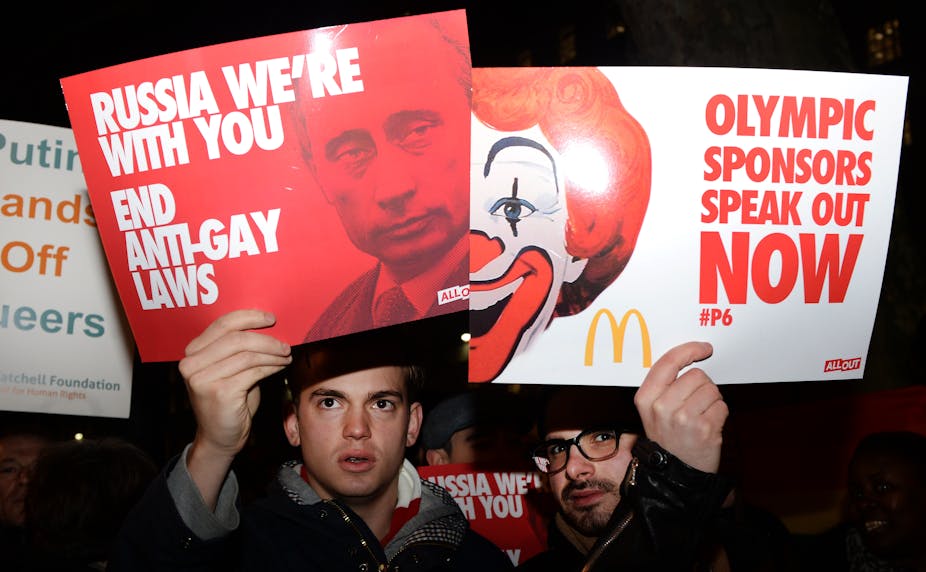Oslo has pulled out of the bidding for the 2022 Winter Olympics, leaving only two cities in the running: the Chinese capital, Beijing, and Almaty, the largest city in Kazakhstan.
This virtually guarantees that the 2022 Games will be staged in an authoritarian country with a poor human rights record – and comes after the Winter Olympic Games in Sochi witnessed a high-profile campaign against the Russian law that bans “propaganda” for “non-traditional sexual relations”.
Coming together under the banner of Principle 6, organisations including All Out, Athlete Ally and Human Rights Watch sought to highlight that this law contravened the International Olympic Committee (IOC)‘s stance on anti-discrimination as defined in the 6th Fundamental Principle of Olympism.
The principle states that any form of discrimination with regard to a country or a person on grounds of race, religion, politics, gender or otherwise is incompatible with belonging to the Olympic Movement.
The repercussions from Sochi have had a major impact on the IOC’s attitude to dealing with discrimination in host countries. After a long campaign and a petition that attracted more than 80,000 signatures, it has been widely reported that the IOC will expect future organisers of editions of the Olympic Games to adhere closely to the requirements of Principle 6.
This positive step has been almost universally acclaimed – but the actual revised version of the host city contract under which the 2022 Games will be held tells a different story.
Hands-off policy
The latest draft of the host city contract for the 2022 Winter Olympic Games is split into two main parts. The first part, the “preamble”, contains a number of scene-setting clauses that provide the context in which the contract is to be performed. The second part, divided into 12 sections, contains 87 specific clauses that define the responsibilities of the host city and its National Olympic Committee.
The section concerned with the promotion of the IOC’s anti-discrimination agenda is found in Clause L of the preamble, and states:
The City and the NOC acknowledge and accept the importance of the Games and the value of the Olympic image, and agree to conduct all activities in a manner which promotes and enhances the fundamental principles and values of Olympism, in particular the prohibition of any form of discrimination with regard to a country or a person on grounds of race, religion, politics, gender or otherwise.
The IOC is obviously to be applauded for responding to the need to take a proactive stand against all forms of discrimination (sexuality falling within the catch-all: “or otherwise”) – but this clause is not the straightforward victory that many have claimed.
Fingers crossed
Only the host city and National Olympic Committee, not the host state or its government, will be subject to Clause L. Although another clause of the preamble calls on the host government “to respect the Olympic Charter and host city contract”, it does not go as far as to demand that legislative amendments or repeals are required to equate respect with compliance.
The wording simply requires that the host city and National Olympic Committee conduct their activities in a manner that promotes and enhances Olympism. This is a far cry from some interpretations of the clause, which read it as a requirement that the host nation actually change its laws to comply with Principle 6.
Moving even further away from requiring legislative change, Clause L merely reiterates the requirement that all signatories of the Olympic Charter, which includes host city organising committees and all National Olympic Committees, adhere to the Charter in its entirety. As a result, Clause L appears to be a simple public reaffirmation of the need for all members of the Olympic Family to comply with the Olympic Charter.
So far, so dispiriting. But what makes this vague approach to anti-discrimination appear particularly toothless is the contrast with the IOC’s demands for the protection of intellectual property rights – where it has no compunction about using real political muscle.
Oh no you don’t
In Clause 41b of the main body of its contract, the IOC explicitly demands that the host state enact appropriate legislation and other means of enforcement to protect the IOC’s intellectual property rights and interests.
Such legislation and enforcement measures must include protections against unauthorised uses of the Olympic Properties, as defined in Rules 7-14 of the Olympic Charter and Clause 41a of the draft host city cntract, as well as ambush marketing.
In contrast to the weak anti-discrimination clauses, at all Games held since Sydney 2000, these requirements have resulted in the host legislature actually passing specific legislation, and granting protections above and beyond those provided by traditional intellectual property law.
They have successfully prevented unauthorised associations with the Olympics and have enabled the venues to be completely “clean”, or free from all advertising – and their immediate environment to be free from all non-official advertisements (at London 2012, for example, these protections were enacted in the London Olympic Games and Paralympic Games Act 2006).
The contrast with the approach to the promotion of anti-discrimination is marked. The IOC knows it is powerful enough to force changes on a host state’s domestic law when its commercial rights are threatened, yet it has chosen not to take a similarly robust approach to the protection of its athletes’ human rights.
With only China and Kazakhstan vying for the 2022 Games, some are wondering if democracies in general are backing away from the extravagant costs of hosting Olympic events.
The current candidature process should push the IOC to take a more proactive stance against discrimination, human rights abuses, and Olympic human values in general – but Clause L does not make the desired breakthrough.

